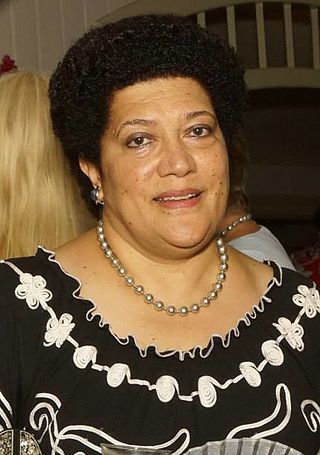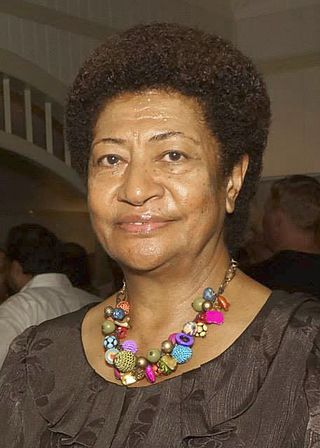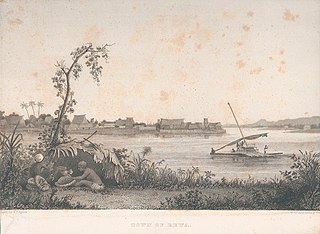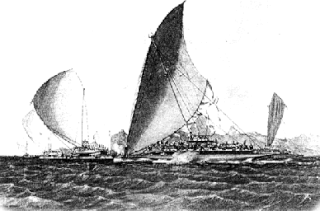
Adi Koila Mara Nailatikau is a Fijian lawyer, who has served as a diplomat and politician. She was also First Lady of Fiji from 2009 until 2015, as the wife of Ratu Epeli Nailatikau, the President of Fiji.

Ratu Seru Epenisa Cakobau was a Fijian chief, monarch, and warlord (Vunivalu) who united part of Fiji's warring tribes under his leadership, establishing a united Fijian kingdom. He was born on Natauloa, Nairai Island in Lomaiviti but spent his youth on Vanuaso, Gau, Lomaiviti, later returning to Bau to re-establish his Father's Ratu Tanoa Visawaqa reign. Ratu Epenisa Seru Visawaqa was given the name "Cakobau" meaning destroyer of Bau, in reference to his grandfathers' (Nailatikau) effort to first claim the tile from the people of Butoni and Lovoni, returned with most of his warriors from Vanuaso, Gau, Lomaiviti to coup the leadership in Bau then and later takeover his father's title; known after his father as the 6th "Vunivalu" or Warlord of Bau.
Ro Lala, Lady Mara, maiden name Litia Cakobau Lalabalavu Katoafutoga Tuisawau was a Fijian chief, who was better known as the widow of Ratu Sir Kamisese Mara, modern Fiji's founding father who served for many years as Prime Minister and President of his country. As Fiji's First Lady, Adi Lala took on a diplomatic role, frequently representing her country abroad. She was regarded as a formidable and astute woman, whose influence on her husband was said to be considerable.
Ratu is an Austronesian title used by male Fijians of chiefly rank. An equivalent title, adi, is used by females of chiefly rank. In the Malay language, the title ratu is also the traditional honorific title to refer to the ruling king or queen in Javanese culture. Thus in Java, a royal palace is called "keraton", constructed from the circumfix ke- -an and Ratu, to describe the residence of the ratu.
The House of Chiefs in Fiji consists of the Fijian nobility, composed of about seventy chiefs of various ranks, majority of which are related. It is not a formal political body and is not the same as the former Great Council of Chiefs, which was a political body with a prescribed constitutional role, although the membership of the two bodies did overlap to a great extent.
Kubuna is one of the three confederacies that make up Fiji's House of Chiefs, to which all of Fiji's chiefs belong.
Tovata is one of three confederacies comprising the Fijian House of Chiefs, to which all of Fiji's chiefs belong.

Ro Teimumu Vuikaba Kepa is a Fijian chief, former Member of the Parliament of Fiji, and former leader of the Social Democratic Liberal Party. She was the first Fijian woman to serve as Leader of the Opposition. She previously held the position of deputy Prime Minister in the Qarase-led Soqosoqo Duavata ni Lewenivanua (SDL) government from 2001 to 2006. As the paramount chief of the Burebasaga Confederacy, she holds the title Roko Tui Dreketi.
Sailosi Wai Kepa was a Fijian statesman, judge, and diplomat.
The Roko Tui Dreketi is the Paramount Chief of Fiji's Rewa Province and of the Burebasaga Confederacy, to which Rewa belongs.
Tu’i Nayau is the title held by the paramount chief of the Lau Islands in Fiji and is synonymous with the title holders over lordship of these islands. When translated, Tu’i Nayau means "Lord of Nayau", an island north of Lakeba, the latter accepted by many to be the chief island in the Lauan archipelago. Prior to being installed as Tu’i Nayau, the claimant must first be confirmed upon the decision of the noble households making up the Vuanirewa clan and then installed Sau or High Chief of Lau. Not every Sau has been installed Tu’i Nayau.
Semesa Koroikilai Sikivou, CBE was a Fijian academic, politician, and diplomat.
There are three confederacies in the Fijian Traditional Government, Kubuna, Tovata and Burebasaga. One of the two Paramount chiefly tribes in the Kubuna Confederacy is the "ToraniBau" the other

Rewa is a province of Fiji. With a land area of 272 square kilometers, it includes the capital city of Suva and is in two parts — one including part of Suva's hinterland to the west and a noncontiguous area to the east, separated from the rest of Rewa by Naitasiri Province. The province had a population of 108,016 at the 2017 census, making it Fiji's third most populous.
Roko is a title of chiefly rank, specifically from the Lau Islands of Fiji. Its equivalent from the Kubuna Confederacy is the Bauan form of Ratu and Ro from parts of the Burebasaga Confederacy. This title was widely used among members of the chiefly Vuanirewa clan up to the mid 19th century. Increasing inte marriage among the chiefly households of Lakeba and Bau, thereafter, saw the increasing use of Ratu and Adi by members of the Vuanirewa dynasty. The current heir to the Tui Nayau title, Finau Mara, uses the Baun title Ratu instead of Roko. This is true for all of his siblings apart from his younger brother Tevita Uluilakeba Mara, who is generally known as Roko Ului.
Roko Tui is the title for the executive head of any one of Fiji’s 14 Provincial Councils. Each province, called a "yasana", is administrated by a provincial council, which itself is subject to the Fijian Affairs Board, variously considered the “guardian” of the traditional Fijian administration system, amongst many other aspects of modern Fijian culture. The name Roko Tui is derived from what was traditionally used as a title denoting the Paramount Chief, and so more often than not the modern role of Roko Tui is given to the Paramount Chief of the regions most chiefly clan.

The Lasakau Sea Warriors were a 19th-century warrior sub-culture in the pre-colonial state of Bau, in Fiji. The sea warriors were instrumental in spreading Bau's political power throughout the South Pacific archipelagic islands. The rise of the eminent islet of Bau amongst other embryonic states was due mainly to the projection of sea power through its naval forces. Bauan chief Ratu Loaloadravu Tubuanakoro was praised by French Captain Dumont D'Urville in May 1827 for his geographic knowledge of the Fijian archipelago signifying Bau's naval influence. More far-ranging than Bau's land warriors led by the Vusaradave clan, the Lasakau clan became the leading proponents of war and tribute for the emerging island kingdom. They became known as the Bai kei Bau or 'War fence of Bau'. Sahlins made the crucial observation that," The kings of Bau based their rule not on native cultivators but on native sailors and fishers-which is to say in Fijian categories, as in political strategies, not on the land but on the sea". This was the great political transformation that catapulted Bau to power over other pre-colonial kingdoms.
Kadavu Province is one of fourteen provinces of Fiji, and forms part of the Eastern Division, which also includes the provinces of Lau, Lomaiviti and Rotuma. Kadavu also belongs to the Burebasaga Confederacy, a hierarchy of chiefs from southern and western Fiji with Roko Tui Dreketi of Rewa as the paramount chief.
The Fiji Native Tribal Congress (FNTC) was established in June 2011 to advance, protect and maintain the rights of indigenous Fijians, in accordance with the 2007 United Nations Declaration On the Rights of Indigenous Peoples (UNDRIP) in a manner that balances equitably those rights with the rights of other individuals and groups in Fiji.




